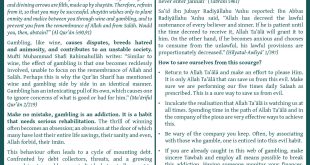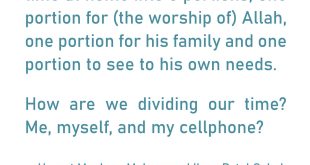(The Indian parliament has passed legislation which effectively grants it control over Waqf properties. This paves the way for the destruction of Masājid and places in jeopardy the long legacy of Muslims and the institution of Waqf.)
What is Waqf?
Waqf is a unique form of endowment in which a person donates a specific asset, typically land or property, for the pleasure of Allāh Ta’ālā. Once a Waqf is complete, neither the original owner nor anyone else is allowed to sell or gift that asset. Likewise, the laws of inheritance no longer apply to that particular item. In simple terms, the item now ‘belongs’ to Allāh Ta’ālā and will remain so until the Day of Qiyāmah.
History of Waqf
Waqf is a concept that Nabi Sallallāhu ‘Alayhi Wa Sallam taught to his illustrious Sahābah Radiyallāhu ‘Anhum. Once Hazrat ‘Umar Radiyallāhu ‘Anhu obtained a valuable piece of land in Khaybar. Upon consultation with Nabi Sallallāhu ‘Alayhi Wa Sallam, he was advised to donate it in the path of Allāh Ta’ālā as a Waqf. This Waqf then benefited the poor, travellers and many other Muslims. (Bukhāri, 2737)
Waqf in India
Many Waqf properties in India can be traced back several centuries. Sultan Muizuddīn Sam Ghaor of the 12th century famously donated two villages as Waqf for the benefit of the Jāmi’ Masjid of Multan. When Firoz Shah Tughlāq was the sultan of Delhi in the 14th century, he made an effort to organise the institutions of Waqf. Over the years, the number of Waqf institutions grew. When the British took over India, they introduced legislation in the 1800s that granted them some control over these institutions. Over the years, this legislation was amended several times until Waqf boards, consisting of only Muslim members, were appointed to oversee these institutions and ensure that no malpractice occurred.
The rise of radical Hindu ideology
The last few years have seen a sharp rise in radical Hindu ideology. Muslims in India are being increasingly suppressed. Masājid are being demolished and converted into temples. Starting from the destruction of the Babri Masjid in 1992, these Hindu mobs have been emboldened by the BJP government’s policies and are laying claim to many historic Masājids. With the latest changes to the Waqf bill, there is a significant likelihood that many more Masājids will be confiscated and destroyed. Other Waqf institutes, such as Madāris, Qabristāns (graveyards), and orphanages, will also come under jeopardy. May Allāh Ta’ālā protect all our Masājids and Waqf institutes, Āmīn!
What changes have been introduced with the new amendments to the Waqf legislation?
The new legislation grants the government more control over all existing Awqāf (plural of Waqf). Non-Muslims will be appointed to serve on every Waqf board as an oversight. These are in addition to the many new rules that will govern how a property can be made Waqf, how it runs and what happens to it after a person passes away. Many of these new rules contradict Shari’ principles. This could also lead to a situation where the government, through its appointed non-Muslim members, potentially interferes with the management and use of Waqf properties, which were originally intended for the benefit of the Muslim community.
Some lessons we can learn:
- Muslims should not become comfortable and complacent while living under a secular democracy. May Allāh Ta’ālā allow us to witness a life under a Muslim ruler who governs according to the principles and rules taught to us by Nabi Sallallāhu ‘Alayhi Wa Sallam and his Khulafā-ar-Rāshidīn, Āmīn.
- The more decentralised our efforts are, the more difficult it is for the enemies of Islām to infiltrate and destroy them.
- While living in a non-Muslim country, a small change to legislation can jeopardise a legacy built over centuries. Those who wish to legalise Islāmic practices under the secular constitution should pay particular heed. Over the past few years, attempts have been made to introduce bills governing Muslim marriages, inheritance, etc. Sadly, many ‘Ulamā lend support to these attempts. The latest changes to the Waqf bill in India should make us realise that even if these bills are initially fully compliant with Shari’ah, there is always a great likelihood that these rules will be changed to conform to the secular ideology found in the constitution. We will then be forced to subscribe to rules that totally contradict Shari’ah. May Allāh Ta’ālā protect us!
May Allāh Ta’ālā protect our Masājid, Madāris, Khanqahs and all the efforts of Dīn from the onslaught of the enemies of Islām. Āmīn
8 Shawwāl 1446 / 7 April 2025
B012
 Wifāq ul Ulāma (SA) ASSOCIATION OF SOUTH AFRICAN 'ULAMA
Wifāq ul Ulāma (SA) ASSOCIATION OF SOUTH AFRICAN 'ULAMA



